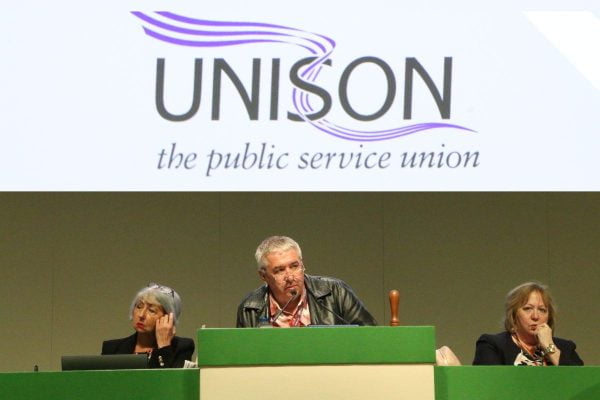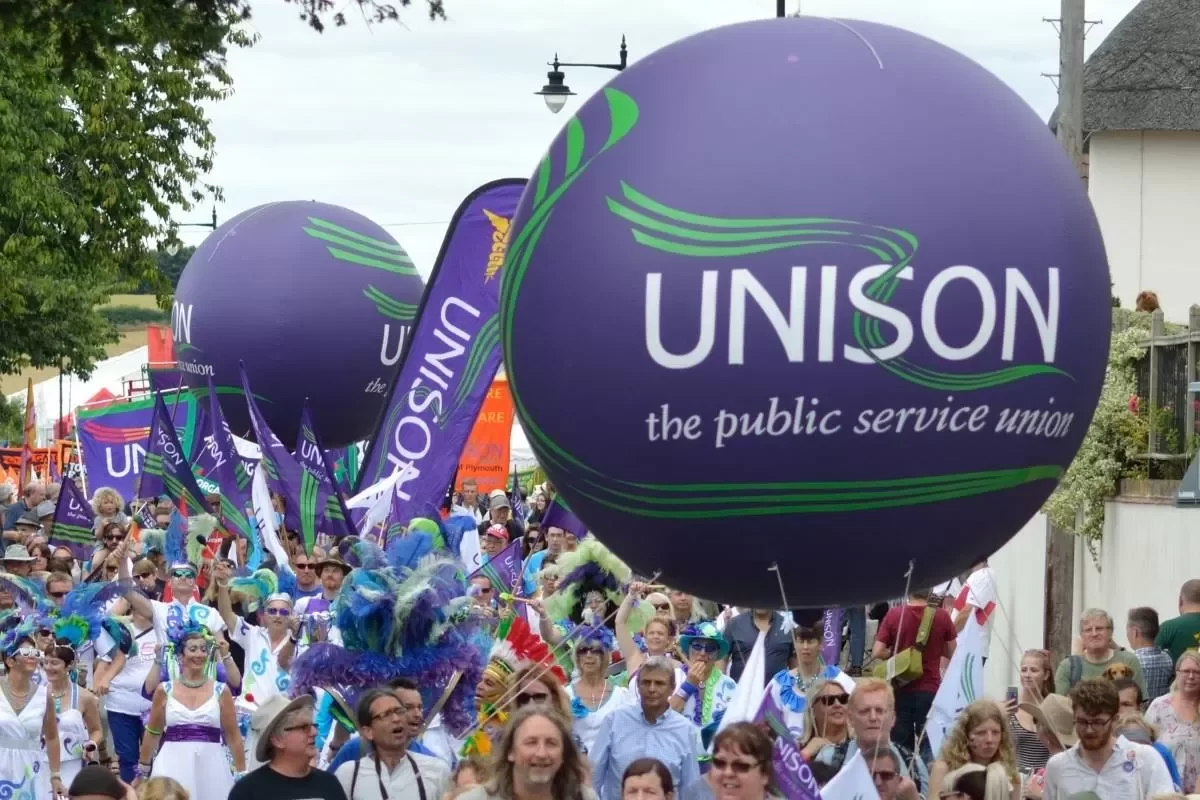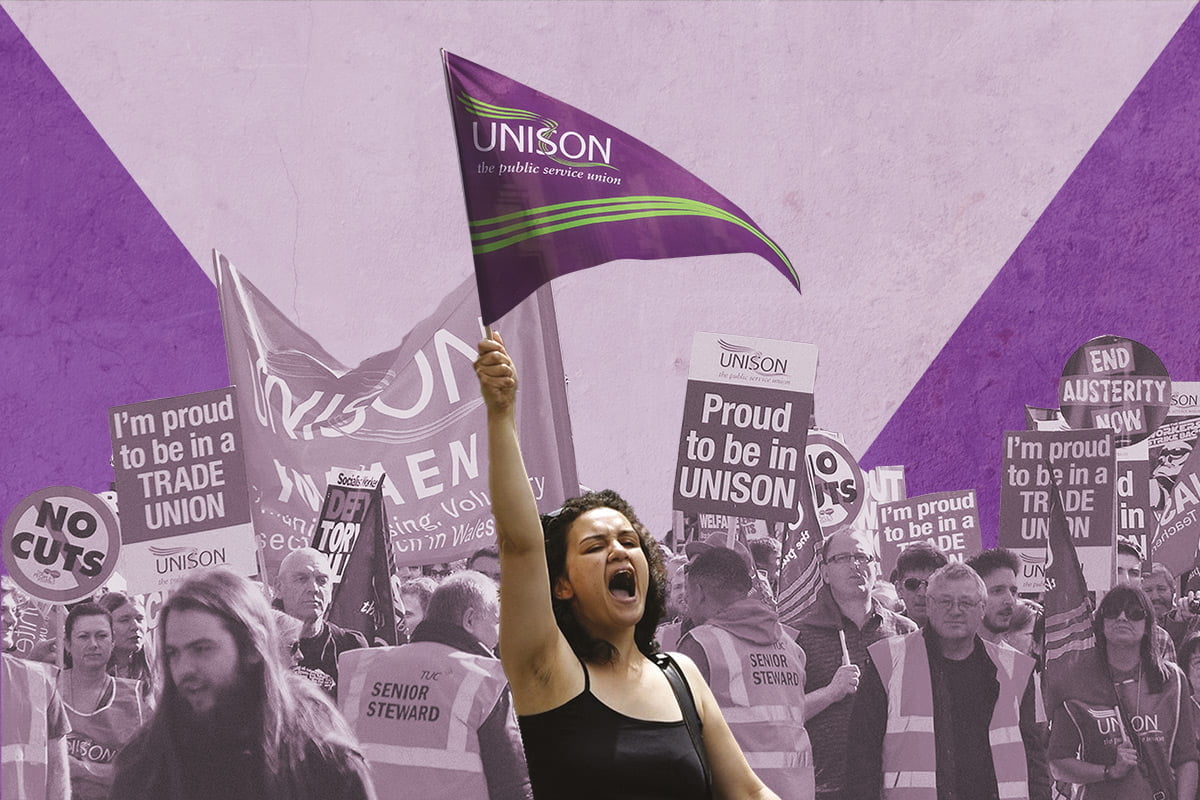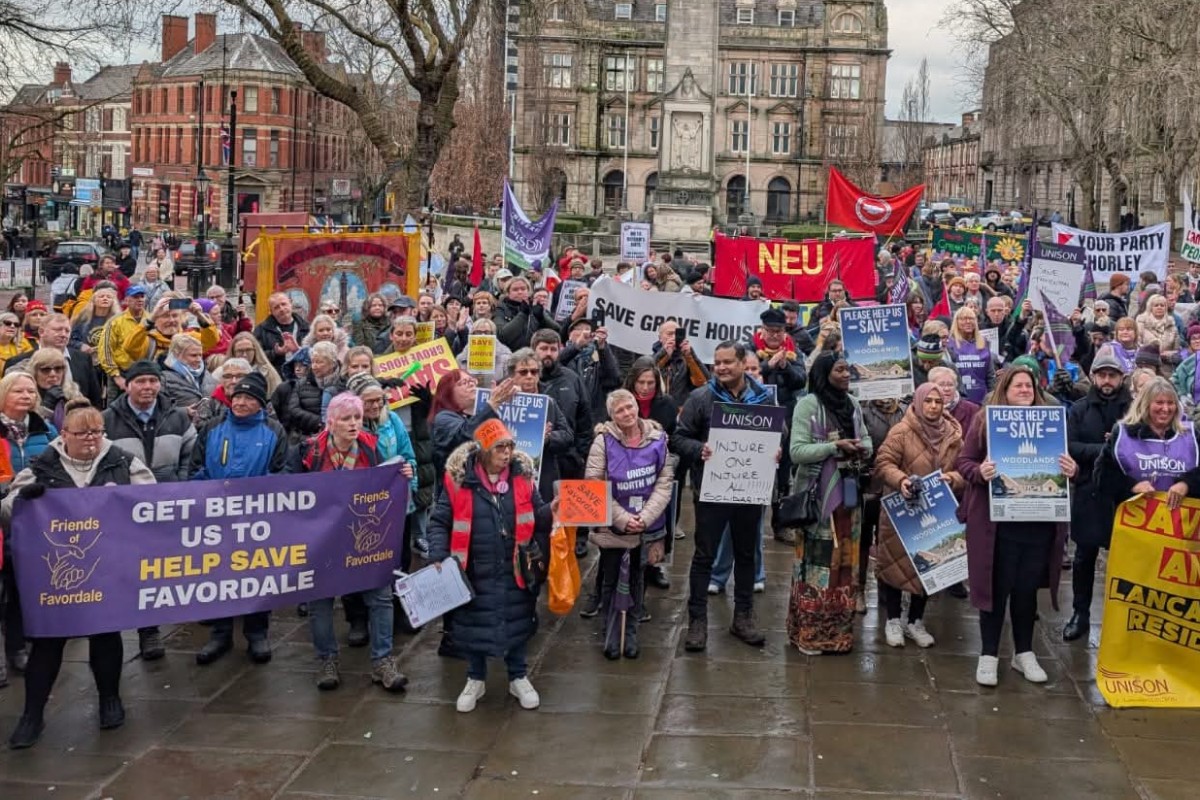Britain’s strike wave has seen ebbs and flows over the past year. In recent months, all eyes have been on the walkouts in the NHS and schools. And council workers could be next in line, with local government unions moving to ballot members over potential action.
This is the backdrop to the developments taking place inside Unison, which represents hundreds of thousands of public sector workers in all these areas: from healthcare, to education, to local authorities.
Sleeping giant
 Elections are currently underway to decide the union’s national executive committee (NEC). Voting ends next Friday (19 May), with the results set to be announced on 8 June.
Elections are currently underway to decide the union’s national executive committee (NEC). Voting ends next Friday (19 May), with the results set to be announced on 8 June.
Given Unison’s size and weight inside the trade union movement, and in the public sector particularly, the outcome of these elections could play a large role in determining the course that these struggles take.
Historically, the bureaucratic leadership at the head of Unison has played a conservative role in dampening the potential of any strike action.
In the massive 2011 public sector pensions dispute, for example, right-wing Unison general secretary Dave Prentis led the way in accepting a rotten deal from the employers, which splintered the burgeoning mass movement.
Similarly, in the recent NHS pay dispute, Unison negotiators have been quick to sign up to a pathetic below-inflation offer, leaving nurses in the RCN to fight on alone.
At the same time, the leadership has failed to build up a base of activists inside the union over the years. Combined with demoralisation amongst rank-and-file members, due to consistent foot-dragging and sellouts from those at the top, this has resulted in low turnouts in many important ballots, such as the latest health pay campaign.
Consequently, Unison – one of Britain’s biggest unions – has yet to make its mark in the growing strike movement. Instead, it is a sleeping giant, whose potential strength remains untested in battle.
Right-wing offensive
 All of this demonstrates the need to transform Unison into a fighting union from top to bottom.
All of this demonstrates the need to transform Unison into a fighting union from top to bottom.
It seemed like Unison was heading in this direction after the last NEC elections in 2021, which yielded a majority for the left-wing Time for Real Change (TRFC) slate.
Unfortunately, however, the left was unable to capitalise on its position. Instead of mobilising grassroots activists to fight the right-wing bureaucracy and transform the union, TFRC were bogged down by bitter internal fights and legal wrangles.
By the time that last year’s national conference came round, the right wing was organised and on the offensive. Recognising the weaknesses of the left, the right smelt blood and launched a vicious attack, cynically utilising identity politics to beat back their opponents.
The left, unfortunately, capitulated to these attacks. And sectarian groups like the Socialist Workers Party (SWP) and the Socialist Party (SP) played a particularly pernicious role in giving credence to the right wing’s accusations of racism, sexism, and bullying.
It is vital that the left learns the lessons of these events. If it maintains its majority following the latest NEC elections, TFRC must use this mandate to redouble efforts to organise grassroots activists and complete the transformation of the union.
Workers in struggle deserve a fighting leadership – one that matches up to their courage and determination.
Witch-hunt
 At the centre of these battles over the past two years has been Paul Holmes, the former president of Unison and a leading figure on the previous TFRC slate.
At the centre of these battles over the past two years has been Paul Holmes, the former president of Unison and a leading figure on the previous TFRC slate.
Paul has been subject to a vicious witch-hunt by an unholy alliance of union bureaucrats, employers, and sectarian elements. This has culminated in him being sacked, on extremely flimsy grounds.
Paul is currently appealing to an employment tribunal, citing unfair dismissal and anti-union discrimination.
His Kirklees Unison branch, meanwhile, has faced two years of suspension and a barrage of attacks from the employers. The branch was ‘placed into administration’ by Unison, and was run from the regional office. Similarly, various branch officers have been suspended for extended periods of time.
One effect of this was to reduce the level of activity of the branch, and reduce the numbers of shop stewards and members.
Win for left
 Subsequently, in 2022, once the regional supervision was lifted, TFRC supporters won a majority of the key officer positions. But then a rule change at the last Unison conference disbarred Paul Holmes from remaining in office as branch secretary.
Subsequently, in 2022, once the regional supervision was lifted, TFRC supporters won a majority of the key officer positions. But then a rule change at the last Unison conference disbarred Paul Holmes from remaining in office as branch secretary.
A vote for a new branch secretary was then organised. And a member of the SP, Angela Waller, was elected after Paul’s nomination was ruled out, and when another nominee from TFRC retired after being denied facility time.
Undeterred by all these setbacks, however, we are delighted to report that the left has won back all of the key positions in Kirklees Unison, at the branch’s recent annual general meeting (AGM).
This is no small victory. Kirklees Unison has a proud record as an active, organising branch – growing to become one of top ten largest branches in the country, with a high density of members in the borough.
With a left leadership locally, the branch can once again resume its fighting role. This win for the left in Kirklees, meanwhile, should inspire grassroots activists across the union in their struggle to transform Unison at every level.
Join the struggle
 The Socialist Party has played a particularly pernicious and sectarian role within Unison, lining up with Kirklees council and the right wing in the union to witch-hunt Paul Holmes.
The Socialist Party has played a particularly pernicious and sectarian role within Unison, lining up with Kirklees council and the right wing in the union to witch-hunt Paul Holmes.
Similarly, the SP helped to split the left vote in both the 2020 Unison general secretary election and in key seats in the 2021 NEC elections.
All of this has played into the hands of the establishment and the old guard in Unison nationally, allowing the right wing to deflect from the real issues facing the union and its members – that is, the fight against austerity and cuts, and for decent pay and conditions.
The victory of the left candidates in the recent Kirklees Unison AGM – Nick Ruff, Mick Donaghue, Cath Kinder and Tim Gilligan – for the branch’s four key officer roles is therefore significant.
This demonstrates the fact that workers will support candidates who are prepared to deliver for them; and also that rank-and-file members can see through even the most systematic campaigns of disinformation and sectarianism.
This result shows what is possible also in the forthcoming Unison NEC elections, where the Socialist Party are once again, scandalously, standing against TFRC candidates.
Socialist Appeal urges Unison members to support those candidates standing under the TFRC banner, and to join the struggle for a democratic, fighting union.






